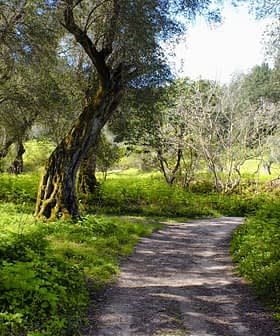Organic Olive Cultivation Increasing Worldwide
The organic land area used for olive cultivation across the world has almost tripled since 2004.
 Organic olive grove in Italy
Organic olive grove in ItalyAgricultural land used for olive cultivation has been steadily increasing each year and has almost tripled in area since 2004, according to an annual survey of global organic agriculture.
The twentieth edition of the World of Organic Agriculture report provided a detailed overview of the state of organic agriculture across the world.
Using data from 181 countries, the survey revealed that 2017 (the last year for which data was available) was a record year for global organic agriculture.
See Also:Organic Olive Oil NewsNot only has the area of organic farmland increased across the world, so has the number of organic producers, while the organic retail market continues to grow in size.
Agricultural land dedicated to organic production now covers about 173 million acres of the earth’s farmland and is cultivated by 2.9 million farmers. The amount of organic produce sold worldwide represented a total value of $97 billion in 2017.
The survey also provides insights into which crops are cultivated on organic agricultural land. Nearly 2.2 million acres of the world’s organic farmland was used for olive cultivation in 2017. This has increased almost threefold from 778,000 acres in 2004, when data on how cropland is used was first collected.
Twenty percent of the world’s total organic agricultural land was used for olive cultivation, according to the report. Olives fall under the category of permanent crops, which along with dry pulses and vegetables experienced growth of more than 15 percent compared to the previous year.
In 2017, 8.3 percent of the earth’s olive groves were under organic production.
A closer look at the detailed geographical data revealed that almost 70 percent of the world’s organic olive groves are in Europe, followed by North Africa with nearly 30 percent – almost entirely (99 percent) in Tunisia.
Tunisia is actually the country with the largest organic land area dedicated to olive cultivation, with more than 629,000 acres. This is followed by Italy with 570,000 acres and Spain with 480,000 acres, while Turkey with 202,000 acres and Greece with 124,000 acres follow in fourth and fifth place.
Figures presented in the survey reveal other interesting facts as well: 15.5 percent of Tunisia’s olive groves are organic, compared to only eight percent in Spain, the world’s largest olive producer.
A closer look at France, one of the world’s smaller producers, showed it has the largest share of organic olive groves: 27.3 percent of its olive production is certified as organic. Organic cultivation is also big in Slovenia and Italy, where slightly more than 20 percent of olive groves are organic, while Cyprus comes in at fifth, after Tunisia, with 14.6 percent.
Coming back to Tunisia, it also stands out as the country with the largest organic agricultural area in Africa, with 757,000 acres. In 1999, it was the first African country to put in place an organic regulation while adopting a national program to increase organic production. In the past 10 years, it has seen an increase in organic exports and Tunisia is one of 10 countries that experienced the highest increase in organic agricultural land in 2017.
Europe has experienced a 92 percent increase in organic olive cultivation in the past 10 years. Only 10 percent of its total organic permanent cropland is used for olive cultivation, but it is still the continent with the largest organic land area used for olives: 1.46 million acres of cropland are covered in organic olive groves.
In Africa, this comes to 635,000 acres, almost all of which is in Tunisia, while in Latin America 64,000 acres are used for organic olive cultivation. Organic olive groves in Asia cover nearly 41,000 acres, while in North America the area is a modest 1,800 acres.
Cropland dedicated to the organic cultivation of olives is continuing to grow globally. There was an 8.3 percent increase between 2016 and 2017, and this is bound to continue increasing as 18 percent of agricultural land used for olives is currently in conversion and on the way to becoming fully organic.








